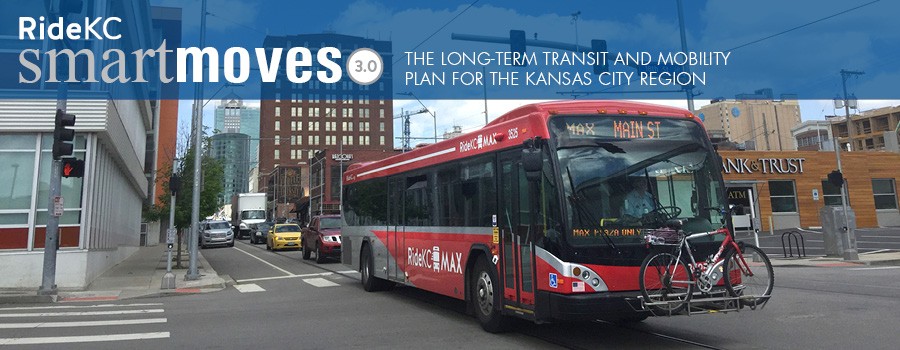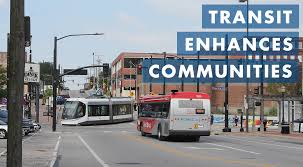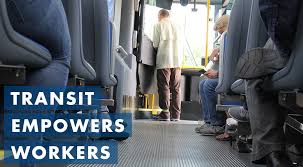New plan guides regional transit initiatives

The Kansas City region is embarking on a new plan setting the agenda for public transportation for the next 20 years, laying out new ideas to better connect our community.
The Kansas City Area Transportation Authority partnered with the Mid-America Regional Council, Johnson County, KC Streetcar, Wyandotte County and Independence to develop a new version of the Smart Moves plan that was first adopted in 2005.
The new updated version — called Smart Moves 3.0 — serves as a guide for the development of new projects and initiatives that will enhance our ability to get around the region during the next 20 years.

The plan promotes efficient and high-volume transit service connected to mobility hubs where riders can seamlessly move from a bus to other types of transportation, including a streetcar, bikes and ride-sharing services.
The Smart Moves 3.0 plan can be found at the Mid-America Regional Council website at kcsmartmoves.org
During the next two decades, the report recommends adding 20 new bus routes, extending some transit routes, improving the efficiency of other routes, extending service hours and increasing travel frequencies across the Kansas City region.
Fixed-route bus service is still the main element of the updated Smart Moves plan, although it groups routes into different categories depending on the type of service, frequency, operating characteristics and the capital amenities.
The plan calls for creating “fast-and-frequent” routes with service every 15 minutes. The fast-and-frequent routes would be the system’s spine.
There would be supporting routes with service running every 30 minutes and express routes operating between the suburbs and downtown at rush hour and possibly at midday.
“The principle motivating these recommendations is to make public transit time and cost competitive with the personal automobile, while also increasing the areas accessible by transit,” the report says.
Expanding bus service is part of the plan’s larger goal of expanding the number of jobs accessible by transit. It’s an answer to a 2011 Brookings Institution report that found that only 18 percent of the region’s jobs are accessible by transit within 90 minutes.
The plan does not contain any money for the suggested improvements, but suggests a variety of ways that local governments across our area could pay for better public transportation.
As part of the plan, Smart Moves calls for developing a network of “mobility hubs” where buses connect with bike sharing, carpooling, the downtown streetcar and other types of transportation.

More than the garden-variety bus stop, the “mobility hub” allows people to move from one type of transportation to another without any difficulty.
Mobility hubs take on different forms and sizes depending on where they might be located. For instance, a mobility hub downtown might provide a kiosk with real-time bus arrival information as well as connections to bike and carpooling services. A mobility hub in suburban Gardner, for example, might include signs, parking and a shelter for vanpool.
Currently, there aren’t any places in Kansas City labeled as a “mobility hub” although the idea is best demonstrated in places such as Waldo, Union Station, Third and Grand in the River Market, the new 3-Trails Transit Center in south Kansas City and Antioch Center in the Northland.
Each of those places are locations where bus riders would have different transportation modes at their disposal. While more improvements are needed before those places might be branded as “mobility hubs,” they do reflect what the plan is trying to accomplish across the region.
Bringing bus service together with other transportation choices at a mobility hub can produce economic development and regional competitiveness.
A network of mobility hubs connecting bus service to other transportation options can lead to the type of economic development that blends public transportation with housing, retail stores and offices.
The new plan also promotes the idea of creating vibrant places by encouraging cities across our region to adopt zoning and planning polices to foster different types of land uses that can be navigated by pedestrians and cyclists.
Smart Moves has proven to be more than just a vision. Since the first plan was adopted in 2005, the region has seen new bus rapid transit service on Main Street and Troost Avenue. The downtown streetcar has started running. New transit centers have been built in Mission and in Wyandotte County at 47th and State Avenue as well as 7th and Minnesota.
The region now has one brand for transit known as RideKC. We now have a regional transit pass. And we have one eligibility process for our paratransit riders.
Smart Moves will make transit better for our entire region. We're excited about the possibilities. We hope you are, too.